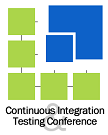attr_accessible
If you use the new 'restful_authentication' plugin, you might have problems to update your User attributes:WARNING: Can't mass-assign these protected attributes: uploaded_data, display_name, first_name, last_name
The solution is to add these attributes in your User model with attr_accessible:# HACK HACK HACK -- how to do attr_accessible from here?
# prevents a user from submitting a crafted form that bypasses activation
# anything else you want your user to change should be added here.
attr_accessible :login, :email, :password, :password_confirmation,
:first_name,
:last_name,
:display_name,
:uploaded_data
attr_accessible specifies a white list of model attributes that can be set via# mass-assignment, such as update_attributes(attributes)
Thanks to this Frederick Cheung who explained it in the Rails mailing list.

 Amsterdam 2008
Amsterdam 2008 2008
2008 2007 & 2008
2007 & 2008
